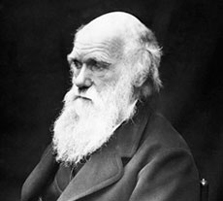
he
ambitious idea of publishing all the letters of Charles Darwin was originally
conceived in 1974 by Frederick Burkhardt, an American scholar; the project
he founded is now based at

University of Cambridge in the UK. Since then,
the Darwin Correspondence Project has doggedly pursued its purpose of
publishing all 14,500 surviving letters in 30 volumes by 2025. From late
2006, however, this work has been supplemented by a program funded by
a $1.1 million grant from the Foundation to create a new web-based resource
on “Darwin and Religion.”

Out of the overall canon, all of Darwin’s letters relating to religious
themes will be selected for online publication, accompanied by contextual
material, notably including contributions from a wide range of experts
involved in current debates about science and religion. Dr. Alison Pearn
and Dr. Paul White, who are directing the program at University of Cambridge,
describe the progress of the project.

“We have electronic transcripts of all of the letters that we know about,”
says Pearn, “and this July volume 16 of the correspondence series main
edition will be coming out, which takes us over half way.” But there
has been some delay in getting the website discussion forum online. “There
are issues over how you would moderate it,” she explains. The problem
is staff time: there are eight staff members in the UK, but not all are
full-time.

Another part of the grant program is very much up and running. This is
a highly successful dramatization of the correspondence between Darwin
and his friend Asa Gray, Harvard professor of botany and a devout Presbyterian.
“We had a premiere public performance in Cambridge, in the UK, in March
2007,” says Pearn, “and we discovered there was a strong desire among
the academic community to have a shorter version we could take to conferences.”

When the drama was taken to America, Asa Gray’s alma mater was understandably
among the academic venues that welcomed it. “The strongest interest in
putting it on came from Harvard and MIT,” reports Pearn. “We’ve already
been asked to take it back again to Cornell, and Boston University would
like to have it, also a number of conferences.” Consideration is being
given to a longer tour of the United States, visiting colleges and large
congregations, as well as the possibility of a week-long production next
year during the Darwin Centenary celebrations at Cambridge.

Both elements of the “Darwin and Religion” program are intended to dispel
misunderstandings about Darwin’s relationship to matters religious. “Those
with extreme views on both sides of the current debate characterize Darwin
as a champion of science against religion,” says her colleague Paul White.
“The main point to make, I think, is that he was rarely dogmatic about
anything. He regarded personal belief as just that—personal—and generally
regarded science and faith as applicable to different areas of human
experience.”

Does the correspondence throw further light on Darwin’s beliefs, or non-belief?
“It appears from a close study of the correspondence that his beliefs
were not static, but neither did he simply move steadily from a position
of faith to a position of no faith.” The issues that the program, and
eventually the website, chiefly address are the debate over design in
nature, Darwin’s personal beliefs, the breadth of religious belief in
Darwin’s day, the implications for ethics of Darwin’s theory, and the
manner in which religious debate was conducted in the period when Darwin
lived.

It is expected these issues will also be addressed in the public prize
essay competitions being held annually as part of the grant program for
the next three years. The first winner will be announced in summer 2008.
What is the big question that dominates the issue of Darwin and religion?
Pearn and White are in no doubt: “I think ‘Who was Darwin?’ is the one
we are best placed to answer—using his correspondence to reveal his humanity
and to put him in the context of his time and his own nature.”



 he
ambitious idea of publishing all the letters of Charles Darwin was originally
conceived in 1974 by Frederick Burkhardt, an American scholar; the project
he founded is now based at
he
ambitious idea of publishing all the letters of Charles Darwin was originally
conceived in 1974 by Frederick Burkhardt, an American scholar; the project
he founded is now based at  University of Cambridge in the UK. Since then,
the Darwin Correspondence Project has doggedly pursued its purpose of
publishing all 14,500 surviving letters in 30 volumes by 2025. From late
2006, however, this work has been supplemented by a program funded by
a $1.1 million grant from the Foundation to create a new web-based resource
on “Darwin and Religion.”
University of Cambridge in the UK. Since then,
the Darwin Correspondence Project has doggedly pursued its purpose of
publishing all 14,500 surviving letters in 30 volumes by 2025. From late
2006, however, this work has been supplemented by a program funded by
a $1.1 million grant from the Foundation to create a new web-based resource
on “Darwin and Religion.”